8 start with I start with I
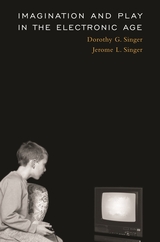
Television, video games, and computers are easily accessible to twenty-first-century children, but what impact do they have on creativity and imagination? In this book, two wise and long-admired observers of children's make-believe look at the cognitive and moral potential--and concern--created by electronic media.
As Dorothy and Jerome Singer show, violent images in games and TV are as toxic as many observers have feared by stimulating destructive ideas and troubling aggression. But should all electronic media be banned from children's lives? Calmly and authoritatively, the Singers argue that in fact some screen time can enrich children's creativity and play, and can even promote school readiness. With guidance from parents and teachers, empathy, creativity, and imagination can expand and intensify in the electronic age.
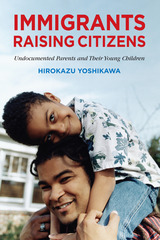
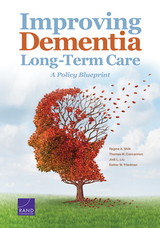
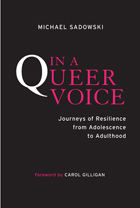
Educator Michael Sadowski deftly brings the voices of LGBTQ youth out into the open in his poignant and important book, In a Queer Voice. Drawing on two waves of interviews conducted six years apart, Sadowski chronicles how queer youth, who were often “silenced” in school and elsewhere, now can approach adulthood with a strong, queer voice.
In a Queer Voice continues the critical conversation about LGBTQ youth issues—from bullying and suicide to other risks involving drug and alcohol abuse—by focusing on the factors that help young people develop positive, self-affirming identities. Using the participants’ heartfelt, impassioned voices, we hear what schools, families, and communities can do to help LGBTQ youth become resilient, confident adults.

Until very recently, almost all books on infancy assumed basic infant immaturity. Remarkably, as Tiffany Field shows in her survey of recent research, investigators are discovering that infants possess sophisticated perceptual skills, such as hearing, even before birth. Newborns can sense touch and motion, discriminate tastes and smells, recognize their mother's voice, and imitate facial expressions. In fact, the newborn is an active learner, looking, reaching, sucking, and grimacing from its first moments in its new environment.
Field provides a readable account of our current knowledge about infant development. She looks at the emergence of sensorimotor and cognitive skills, which play an important role in social and emotional development in the months following birth as the infant experiences the world. In a chapter with important implications for working mothers, Field reviews the literature on infants in nursery and daycare programs, countering negative assessments with studies that show an enhancement of infants' social interaction in good care settings. In the concluding chapter, she pays particular attention to infants at risk because of disease (including AIDS), maternal drug use, prematurity, or maternal depression, and describes possible intervention strategies. The bibliography provides an invaluable summary of significant primary reference papers for professional researchers, students, and parents.
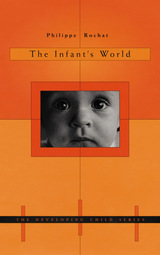
What do infants know? What do they feel, and how do they come to understand what’s happening around them? How do they begin to construe others as persons with feelings and intentions? These questions inspire this remarkable new look at the infant’s world. The short answer? Infants are much more sophisticated perceivers, feelers, and thinkers of their world than we may think.
In this lively book, Philippe Rochat makes a case for an ecological approach to human development. Looking at the ecological niche infants occupy, he describes how infants develop capabilities and conceptual understanding in relation to three interconnected domains: the self, objects, and other people. Drawing on the great body of contemporary “competent infant” research, Rochat offers a thoughtful overview of many current, controversial topics, from neonatal imitation to early numeracy, to the development of self-awareness. In a provocative conclusion, he describes infancy as a series of key transitions—so dramatic that they are sometimes called “revolutions”—and maps out the processes that impel development.
Offering a unifying theoretical vision of the vast research of recent years, The Infant’s World is an inspiring introduction to the liveliest area of modern psychology.
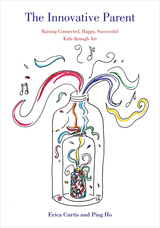
2019 National Parenting Products Award Winner
Even the best talk-based practices in parenting can be limiting. How can art help parents temper storms of emotion, defuse sibling conflicts, get teeth brushed, and raise happy, successful kids? In The Innovative Parent, Erica Curtis and Ping Ho integrate cutting-edge research, years of clinical expertise, and their own parenting experience into a revolutionary yet practical guide to creative parenting. Plentiful illustrations and anecdotes bring concepts to life and show art in action with kids and parents.
Together, Curtis and Ho let parents in on art therapy trade secrets to help children make sense of emotions, build connections with others, develop problem-solving skills, resolve day-to-day conflicts, process and retain information, confront fears and anxiety, and much more. These are complex tasks for something as seemingly simple as making art, yet therein lies the beauty of The Innovative Parent: its down-to-earth approach is simple, doable, and fun.
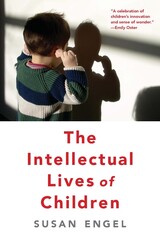
“A remarkable book. Whether you are an educator, parent, or simply a curious reader, you will come to see, hear, and understand children in new ways.”
—Howard Gardner, author of Multiple Intelligences
Adults easily recognize children’s imagination at work as they play. Yet most of us know little about what really goes on inside their heads as they encounter the problems and complexities of the world around them. Susan Engel brings together an extraordinary body of research to explain how toddlers, preschoolers, and elementary-aged children think.
A young girl’s bug collection reveals how children ask questions and organize information. Watching a boy scoop mud illuminates the process of invention. When a child ponders the mystery of death, we witness how ideas are built. But adults shouldn’t just stand around watching. When parents are creative, it can rub off. Engel shows how parents and teachers can stimulate children’s curiosity by presenting them with mysteries to solve, feeding their sense of mastery and nourishing their natural hunger to learn.
“A fascinating read for parents who wonder, simply, what is my child thinking? Why do they love collecting? Where did that idea come from? A celebration of children’s innovation and sense of wonder.”
—Emily Oster, author of Expecting Better
“Combining insight, scientific acumen, and exquisite narrative, The Intellectual Lives of Children allows readers to peer into the minds of infants, toddlers, and preschoolers as they explore and learn in everyday moments, emphasizing what constitutes real learning.”
—Kathy Hirsh-Pasek, Science
READERS
Browse our collection.
PUBLISHERS
See BiblioVault's publisher services.
STUDENT SERVICES
Files for college accessibility offices.
UChicago Accessibility Resources
home | accessibility | search | about | contact us
BiblioVault ® 2001 - 2024
The University of Chicago Press









